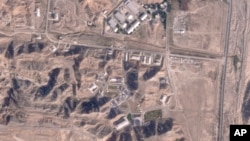Germany closes 3 Iranian consulates following Iran's execution of German Iranian national
- By VOA News

Germany will close three Iranian consulates in response to Iran’s announcement of the execution of Jamshid Sharmahd, a German Iranian national and a U.S. resident, earlier this week.
"We have repeatedly and unequivocally made it clear to Tehran that the execution of a German citizen will have serious consequences," German Foreign Minister Annalena Baerbock said Thursday in announcing the closure of the consulates in Frankfurt, Munich and Hamburg.
Germany will allow Iran’s embassy in Berlin to remain open. And Germany will "continue to maintain our diplomatic channels and our embassy in Tehran,” Baerbock said.
"The fact that this assassination took place in the light of the latest developments in the Middle East shows that [Iran's] dictatorial, unjust regime ... does not act according to normal diplomatic logic," she said. "It is not without reason that our diplomatic relations are already at an all-time low.”
Sharmahd, 69, was accused of a role in the deadly bombing of a mosque in Shiraz in 2008. He was convicted of the capital offense of “corruption on Earth,” a term Iranian authorities use to refer to a broad range of offenses, including those related to Islamic morals.
His family has denied the charges against him.
In an exclusive interview with VOA’s Persian Service, Sharmahd’s daughter Ghazaleh Sharmahd warned that her father's execution on Monday would not silence the movement for justice.
“They made a huge mistake, thinking that by killing my father and the people of Iran, these movements would end. But they were wrong — killing only makes these movements stronger, more intense and more energized. ... The Islamic Republic made a huge mistake,” she said.
Ghazaleh Sharmahd also said she is seeking the truth of her father’s death. She told VOA that the Islamic Republic informed the U.S. and Germany about her father’s death.
“They accept the words of terrorists and send me their condolences?” she said. “They have a duty to investigate what really happened.”
VOA’s Persian Service contributed to this report. Some information came from Agence France-Presse and Reuters.







